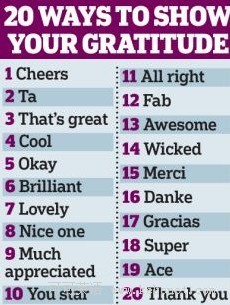(单词翻译:单击)
If you do someone a good turn today, don’t expect a thank you. ‘Cheers’, ‘ta’ or even ‘wicked’ is the more likely response, if a survey is to be believed. Research among computer users suggests that the traditional expression of gratitude has fallen by the wayside. Cheers, oh and ta for dinner: The traditional 'thank you' is being usurped by snappier ways to show thanks, like 'Wicked', 'You star' and 'Cool'
如果今天的你做了好事,可能别再期待对方向您说:“谢谢”两个字了。在西方,传统的道谢方式兴许已经过时,现如今如果您做了好事,比较容易听到的“谢谢”不再是“Thanke you”,而被”“干杯”(Cheers,在酒桌上使用。),或者时髦表达高兴愉悦的语气词‘ta’、还有撒娇的词语“wicked”、 'You star'(你还不错哦) and 'Cool'(酷) 逐渐成为如今“谢谢”的替代品。

Four out of ten said ‘thank you’ sounded too formal - so they used more catchy, chatty words such as ‘fab’, ‘lovely’ or ‘wicked’. A third said they would often just resort to a quick wave instead of saying ‘thank you’. And 77 per cent said that any of the words used to say thanks were irrelevant, believing a pleasant gesture works just as well.
据调查称,10个被调查的人中有4人觉得“谢谢”过于正式了,他们觉得比较俏皮的表达感谢的方式不容易在交谈的人中间产生尴尬。在调查的人中,有77%的人表示,在表示感谢的时候,做一些善意的手势比起正儿八经说声谢谢要来得重要,来得惬意。

The poll of 3,000 people was carried out by the online gift store Me to You. According to the survey, two thirds of respondents believed Britain was a ‘rude’ nation and 84 per cent think others should make more of an effort to show appreciation. Four in ten admitted they did not send thank-you letters if they receive gifts through the post, and the same percentage would not make their children send one either.
以上是3000网民对“谢谢”表达方式的英文排名,传统的 “Thank you” 竟然被排到了第20位。以往最传统的国家——英国被三分之二的网民被认为越来越“粗鲁”了,调查中,84%的人认为对方应该在表达感谢上做出更大的努力。10个人中有4个人承认,如果他们收到礼物,他们不再选择通过使用邮寄“感谢信”的方法表达感谢。


